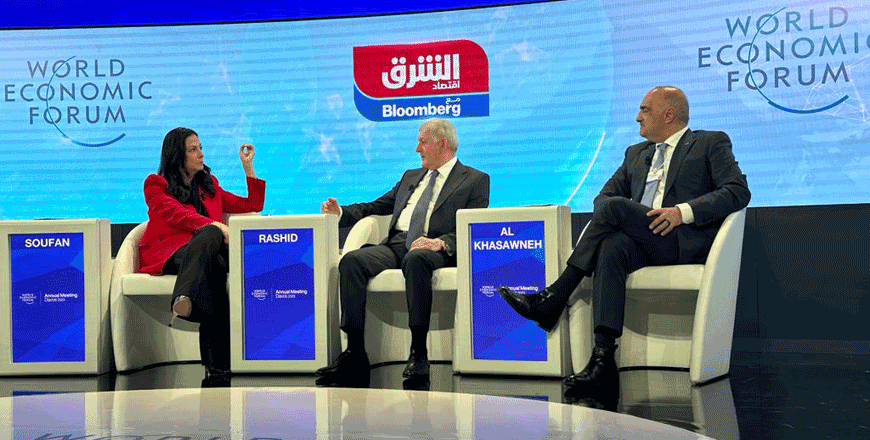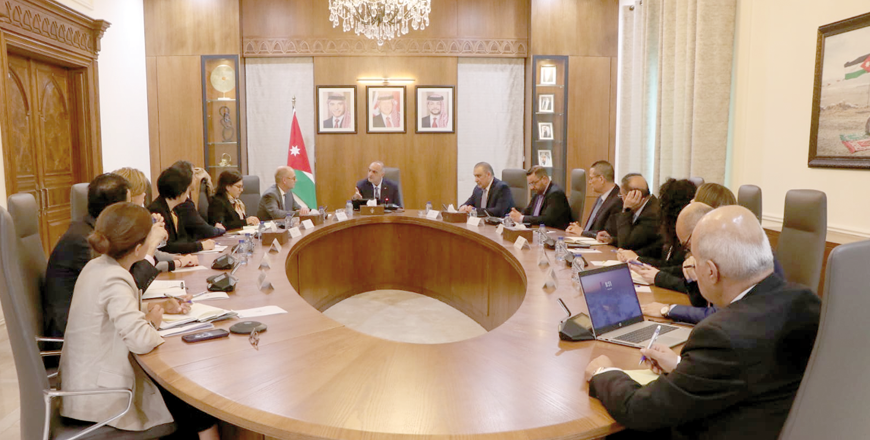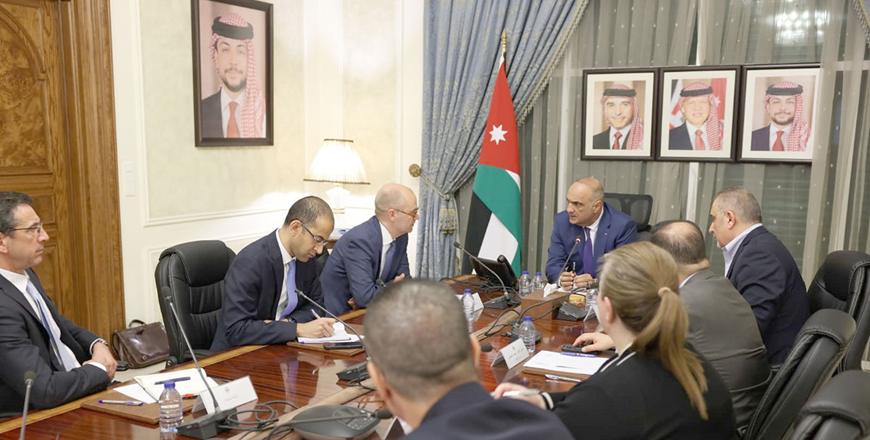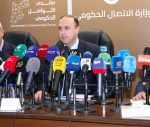You are here
PM continues talks at WEF 2023 in Davos
By JT - Jan 19,2023 - Last updated at Jan 19,2023

Prime Minister Bisher Khasawneh attends a panel session on the sidelines of the 2023 World Economic Forum Annual Meeting, currently held in Davos, Switzerland, on Thursday (Petra photo)
AMMAN — Prime Minister Bisher Khasawneh on Thursday continued to meet with global political and economic leaders as part of his participation in the 2023 World Economic Forum (WEF) Annual Meeting, currently held in Davos, Switzerland.
During the meetings, Khasawneh discussed cooperation in many areas, particularly in terms of investment and economy, and stressed that Jordan has taken “serious steps” to regulate the investment environment and remove obstacles facing investors, aiming to encourage and enable foreign and domestic investments, the Jordan News Agency, Petra, reported.
During his meetings, the prime minister stressed the importance of the comprehensive modernisation project led by His Majesty King Abdullah and its three tracks: The political modernisation system, the public sector modernisation roadmap, and the economic modernisation vision to be implemented over the next 10 years.
During his meeting with Tunisian Prime Minister Najla Bouden, Khasawneh reaffirmed Jordan's desire to boost relations between the two countries to the benefit of joint interests and the aspirations of the leaders and peoples of both countries.
In this regard, the two sides agreed to hold meetings of the Jordanian-Tunisian Joint Higher Committee in Amman soon to discuss cooperation and develop future prospects for partnership.
Bouden welcomed the activation of talks between the two countries through the Jordanian-Tunisian Joint Higher Committee that aims to enhance prospects of cooperation and boost ties.
Khasawneh also met with the Executive Director of the International Monetary Fund (IMF) Kristalina Georgieva, and discussed prospects to continue cooperation to boost Jordan's financial and monetary stability in order to achieve the Kingdom’s economic objectives, mainly reducing unemployment and increasing citizens' standard of living.
Georgieva commended Jordan's successful completion of the fifth review of the extended facilitation programme, which is being implemented with IMF that has made Jordan a “successful example” of economic reform in the region.
She also commended the achievements of Jordan's financial and monetary policies, which were able to maintain financial and monetary stability. As well as she praised the success of Jordan's fiscal policy in reducing deficits and debt for the third consecutive year without raising taxes through a tax base expansion brought about by fighting tax avoidance and evasion.
The prime minister referred to the importance of the economic reform programme signed between the government and the IMF, which is designed by Jordanian personnel and based on national objectives set by the government.
In this regard, Khasawneh said that through this programme, the government has increased the competitiveness of the economy, maintained financial and monetary stability, attracted foreign and domestic investments, created jobs and increased levels of growth. All has been possible through structural reforms that contributed to higher credit ratings for the Kingdom at a time when many countries saw their ratings fall, he added.
Khasawneh and EU Commissioner for Economic Affairs, former Italian Prime Minister Paulo Gentiloni, discussed the strategic partnership between Jordan and the EU in various fields.
The prime minister expressed Jordan's appreciation for the EU’s support to the Kingdom aimed at ensuring the success of its development programmes and modernisation plans, and stressed the need to expand prospects for partnership and cooperation between the two sides.
Gentiloni expressed the EU's appreciation of the strategic partnership with Jordan and its reform efforts, particularly in facing economic challenges through the economic modernisation vision. The commissioner referred to Jordan's role and contributions in hosting and providing services for refugees, as well as the Kingdom’s endeavours for security and stability in the region.
Khasawneh also met with President of the European Investment Bank (EIB) Werner Hoyer, where the two sides stressed the desire to boost relations between Jordan and the bank, and create ways to ensure continued cooperation and strategic partnership.
In this regard, the prime minister commended the bank's contribution to supporting economic reform policies and development projects in Jordan, and particularly its contribution to financing part of the National Water Carrier Project. Last month, the government signed a concessional loan agreement worth 200 million euros with the European Investment Bank for December’s contribution to financing part of the scheme.
Hoyer praised the fruitful cooperation between the Jordanian government and its international partners, including the EIB, and underscored the bank's support for investments to transform Jordan's vital service sectors, such as the National Water Conveyance Project.
The prime minister also met with Visa CEO for Global Financial Services Ryan McInerney over means to cooperate in developing technological infrastructure for financial transactions and activating the digital economy.
Khasawneh referred to the inception of the Investment Ministry as a main reference for investment in the Kingdom, as well as the adoption of the new Investment Environment Law.
Minister of Finance Mohamad Al-Ississ, Minister of Environment Muawia Radaideh and Minister of Planning and International Cooperation Zeina Toukan attended the meetings.
Related Articles
AMMAN — Prime Minister Bisher Khasawneh welcomed Head of the International Monetary Fund (IMF) mission to Jordan, Ron van Rooden, and his de
AMMAN — Prime Minister Bisher Al Khasawneh met on Monday the World Bank Group president Ajay Banga in Dubai.The meeting was held on the side
AMMAN — Prime Minister Bisher Khasawneh on Monday received Head of the International Monetary Fund (IMF) Mission to Jordan, Ron van Rooden,
















